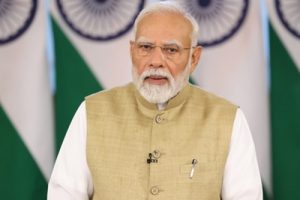Article 153 of the Constitution says, “There shall be a Governor for each State”. The Executive power of the State is vested in the Governor (Rajyapal). The Government of the State is run in his name. He is appointed by the President of India and holds his office during his pleasure.
To be eligible for the appointment as Governor of a State a person should be a citizen of India and must have completed the age of 35 years. He must lot be a member of either House of the Parliament or of any State Legislature. If he is a member of any Legislature, he automatically vacates his seat on assuming the office of the Governor.
He is entitled without payment of rent to the use of his official residence and shall be entitled to such emoluments, allowances and privileges as may be determined by the Parliament by Law. The salary of the Governor has been fixed at Rs. 36,500 per month, plus such other allowances and privileges as may be deemed fit to a constitutional head of a State.
His emoluments and allowances cannot be changed during his term of office. Every Governor and every person discharging the functions of the Governor, before entering upon his office, has to make and subscribe in the presence of the Chief Justice of the High Court of the State concerned, an oath Or affirmation in the prescribed form.
Appointment of the Governor of a State
The Governor of a State is appointed by the President by warrant under his hand and seal. He holds office during the pleasure of the President. There was a long and hot discussion on the appointment of the Governor in the Constituent Assembly. There were four alternatives before the Constituent Assembly for the appointment of the Governor. They were –
(i) Election by adult suffrage,
(ii) Election by the members of the Lower House or both the Houses of the State Legislature either by the system of proportional representation or otherwise,
(iii) Selection by the President out of a panel of four names submitted by the Lower House of the State Legislature, and
(iv) Appointment by the President.
Out of these four alternatives, the Constituent Assembly decided in favour of the nomination of the Governor by the President. The Draft Constitution contained the provision of direct election of the Governor by the people. In a parliamentary setup, a directly elected Governor was unnecessary.
The following reasons were advocated in accepting the existing practice of nominating the Governor by the President:
(a) The Governor in a State under the Parliamentary Systems to be a mere constitutional head. His position is a ceremonial one. The Council of Ministers headed by the Chief Minister is the real executive head.
Thus direct election of a Governor does not fit in a parliamentary system of Government. Explaining this point Dr. B. R. Ambedkar said in the Constituent Assembly, “The Governor has no function to which he is required to exercise either in his discretion or his individual judgment.
According to the principles of the Constitution, he is required to follow the advice of his Ministry in all matters. If the Governor has no power of interference in the internal administration of a Ministry which has a majority (in the Legislature), then it seems to me that the question whether he is elected or appointed is a wholly immaterial one”.
(b) A directly elected Governor may create a problem of political leadership. If he is directly elected, he cannot be above party politics. He may sometimes quarrel with the Chief Minister by claiming that he is also the popular leader of the people.
Direct election would further involve wastage of money, and energy. As K. M. Munshi pointed out in the Constituent Assembly, “Why waste money and energy in a huge election for a second rate man in the party as the head of the Government? It would mean also that the Governor will be subsidiary in importance to the Chief Minister as he would be his nominee. If this is going to be the case why this farce of election”.
A directly elected Governor may not be loyal to the Centre and the Constitution. The intention of the makers of the Constitution in creating the Office of Governor was to provide a link which would bind the Centre and the States in securing the constitutional propriety and national unity.
(c) The suggestion that the Governor should be directly elected by the State Legislature was not accepted by the Constituent Assembly. In this case he would be a pawn in the hands of the majority party in the State legislature.
This might hamper his impartiality and independence in taking sides with the Party which elected him. The scheme of appointment of the Governor by the President out of a panel of four names submitted to him by the State Legislature of the concerned State was also rejected as unsound.
In this case, factions and groups may come into play. Each group would like to see a member of that group to be placed on the panel. “This group affinity reflected in the selection of group men on the panel and the ultimate selection of one man from the panel might undermine party cohesion.
Further, if the President chooses one down in the line from the panel those who nominated the first name are bound to nurse a grouse against such a man. This may even lead to bad relations between the Governor and the State Cabinet”.
(d) An appointed Governor will suit to the requirements of the office more efficiently than an elected one. In this respect the Canadian Constitution had an influence over the makers of our Constitution. In the Constitution of Canada the Governors of the Provinces are appointed by the Governor-General and they hold office during the pleasure of the Governor-General.
The American practice is to elect the Governor by the people. In comparing between these two practices the makers of the Constitution decided in favour of the Canadian practice. As Alladi Krishnaswamy Aiyar said in the Constituent Assembly: “On the whole, in the interests of harmony, in the interests of good working, in the interests of sounder relations between the Provincial Cabinet and the Governor, it will be much better if we accept the Canadian model”.
Thus, the Constituent Assembly rightly decided that it would be worse than useless making the Governor’s office an elective one. Hence it favoured the system of nomination of the Governor by the President.
A convention has almost been established to appoint a non-resident of a State as its Governor. It is accepted that a resident of another State will have no political entanglements in the State and shall act with greater independence and impartiality.
Further, it helps to emphasize the sentiment of national unity and militate against the narrow spirit of linguism, parochialism and chauvinism which seems to make headway in some parts of our country. Another healthy convention that has developed is the practice of consulting the Chief Minister in appointment of the Governor of the State concerned.
This consultation eliminates the chance of imposing a person as a Governor who is not agreeable to the State concerned. It further, enables the selection of agreed candidate who may act as a wise counsellor and prudent adviser to the Council of Ministers..
























